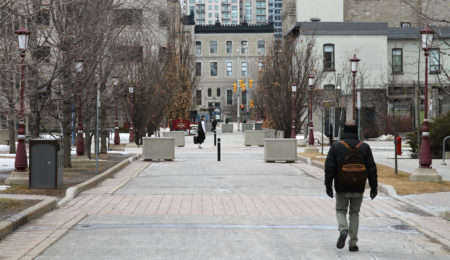Eleven G20 arrestees see charges dropped, six jailed
MONTREAL (CUP)—THE COURT CASE of 17 alleged conspirators involved in the G20 protests of June 2010 ended Nov. 22, with six found guilty and 11 walking free.
Two of the 17 are organizers from a group called Convergences de luttes anti-capitalistes (CLAC). Patrick Cadorette, one of the CLAC organizers, was the last to see his charges dropped. Cadorette had been accused of three counts of conspiracy, including mischief resulting in damages of over $5,000, conspiracy to obstruct police, and conspiracy to assault police officers.
The G20, a meeting of the leaders of 20 of the largest economies in the world, had collected a lot of opposition during the meeting in Toronto. Over 900 people were arrested, making it the largest mass arrest in Canadian history.
The arrests were also the result of what was revealed to be the largest police spy operation in Canadian history, which the CBC reported had involved more than 500 policemen at certain points. Cadorette believed he and the others involved in the case were wrongfully accused.
—Jordie Yeager, the Link
Saskatchewan’s HIV rates twice the national average
REGINA (CUP)—PEOPLE IN SASKATCHEWAN had every reason to unite for World AIDS Day on Dec. 1. According to the Saskatchewan Ministry of Health, the HIV rate in Saskatchewan is twice the national average.
In the rest of Canada, approximately nine out of every 100,000 people have been infected with HIV, compared to approximately 21 out of every 100,000 people in Saskatchewan. The number of new cases alarmed health officials in early 2009, a year and a half before the Ministry of Health released the most recent data—and there’s been near-total silence on the subject since.
The high rates of infection are mainly due to intravenous drug use—75 per cent of new HIV cases are associated with drug users and needle sharing.
—Natasha Tersigni , the Carillon
NSCAD ratifies tentative agreements before Windsor Report’s release
FREDERICTON (CUP)—THE NOVA SCOTIA College of Art and Design (NSCAD) and its faculty union have avoided a strike in the eleventh hour after five months at the bargaining table.
The ratification of the tentative agreement came in a timely manner as the Windsor Report is scheduled to be released in the coming days. The report, conducted by former Nova Scotian deputy minister Howard Windsor, will recommend the optimal funding arrangement for the future of the university on the provincial level.
The school is one of six Nova Scotian universities being examined because of financial difficulties. NSCAD is facing a $2.4-million deficit for the 2011–12 year. The 18-month faculty contract, retroactively beginning July 1, will expire Dec. 31, 2012, and both sides are expecting the negotiations to restart next fall.
—Colin McPhail, CUP Atlantic Bureau Chief
Alcohol banned in St. Thomas University residence
FREDERICTON (CUP)—ST. THOMAS UNIVERSITY’S Harrington Hall has gone dry. An alcohol ban came into effect at the residence this week after several incidents this past semester grabbed the attention of the university’s dean of students, Larry Batt.
Discharged fire extinguishers, paper towel being set on fire, and broken glass throughout the residence are among the problems Harrington has faced. A fight during Harrington’s first house party of the year also netted the house some negative attention. Students aren’t allowed to drink or possess alcohol in Harrington for the remainder of first semester.
The ban will be reviewed in second semester. Residents found out about the ban at a Nov. 27 meeting at the Ted Daigle Auditorium. The meeting, which Batt estimated 100 students attended, was compulsory.
—Karissa Donkin, the Aquinian



